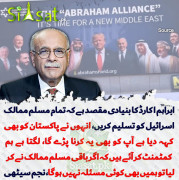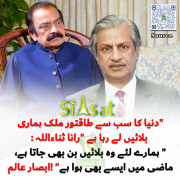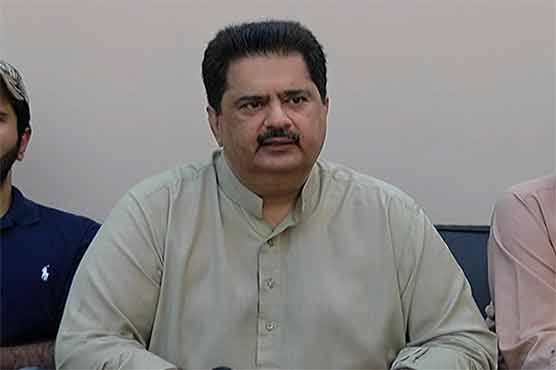bilkul durust farmaya jnab ne.... Agar hazrate Ali KW AS ne jinko gali di hai aap bhi unhain gali de dije warna apni mojuda zindagi ko kisi achche kaam men laiye.... koi sunni aur shai durust aqeede per nahin..... deen sirf islam hai baqi sab dukan chalane ke zarye hain....
*******Wahid hal islami inqelab, jiddojohad karo, sabr karo, firqabazai haram hai muslim bano...
kya milta hai ye nab shoot phelanay say?
Kya tum itnay baraay hoo gayer ho kay jo loog Hazrat Muhammad (PBUH) ka haat per imaan laayee unka hisaab kitaab karo gay.
tauba karo aur apnay aimaal theek karo.
These days anyone who is interested in discussion on Islamic subjects will come across a lot of discussion boards where there are a long and often-pointless debates going on between Shia Muslims and Mainstream Muslims (I prefer to use the term “Main Stream” rather than Sunnis which gives an impression of sectarianism).
The features of these kinds of debates are as follow:
1. They seem to be endless
2. In some point one of the sides starts using offensive language and usually this is the reason for ending the debate
3. They are repeated material that are posted every now and then in many websites
Before explaining what is an appropriate way to discuss with Shia I need to make an important point and then refer to some facts.
The point:
It is a pity to see engaging in long and often fruitless debates over Internet wastes the valuable time of a Muslim youth. Long debates like this result in making the heart and soul dry and very materialistic. I think the time of a responsible Muslim should be devoted to his/her efforts to more effective things like education, prayer and reading Qur'an, Improving his/her purity for the God, increasing practically useful Islamic knowledge, making him/herself a good example of a Muslim, helping others and of course, enjoying life and family and friends without committing any sins.
Now some facts:
1. After the revolution in Iran, the Shia scholars became very powerful and they invested a lot to spread Shia’ism in Islamic countries. What they are doing in Africa, in Saudi Arabia during Hajj, in Western countries and over the net are only parts of these activities.
2. Every belief usually has a main stream followers and then sectarian followers. It is a simple fact that the sectarian followers always need to defend themselves against the main stream while the main stream feels less necessary to challenge the sects. This results in mainstreams having less idea about the belief of sects while sects have a rather good idea about the belief of the mainstream. This in terms results in the main stream being less prepared to discuss with the sects while sects are always prepared to discuss with the mainstream. For instance: Among Christians, Mormons have a strong discussion material when entering a debate with mainstream Christians while the Mainstream Christians have less idea about what are the Mormons all about. In the same way Shia is more prepared to discuss with mainstream Muslims. The same rule applies to Shia themselves. The Shia that are usually starting debate with mainstream Muslims are Imami (12er) Shia. However, among them there are minorities like Zaidi Shia or Ismaili Shia. These minorities usually are very much prepared to enter a debate with Imami Shia while an ordinary Imami Shia usually has no idea about the belief of these minorities.
3. The above fact results that some of the mainstream Muslims have wrong idea about the belief of Shia and their practices.
4. The three points above leads us to the fourth fact: One of the reasons you find that Shia people are very much engaged in discussion with mainstream Muslims, particularly over internet is that there are lots of material available for them that they usually find a relevant answer to any question and copy and paste it in reply. These materials are loaded systematically in many shia sites and online books like: Shia Encyclopedia - Tijani’s works – Peshawar Nights – website and the rest. They can simply print out a short article and nicely fold it like a catalog and leave it in a mosque. Comparing to this vast activities, mainstream Muslims do not have such an access to good material.
5. Shia is far better in debate in English websites. This is because while most of the Shia propaganda books are translated to English, unfortunately less good Arabic books of the mainstream Muslims that provide answers have been translated to English.
6. Unfortunately due to some prejudice from some of the Scholars, many of the mainstream Muslims now a days have opinions that put them in a fragile position when debating with Shia. These opinions are not backed by any strong evidences and many of them are newly emerged opinions rather than old opinions. Among them are:
a) The belief that what ever is in Sahihayn is authentic
b ) The belief that any one who has seen the Prophet even for a short while can be considered Sahabi and thus can be trusted.
c) The belief that anything that Sahabeh and others have done during and after the death of the Prophet pbunh are right or that all their behavior has to be justified (please note that I am not suggesting criticizing Sahabeh, I am just saying that we don’t need to feel responsibility to justify anything they have done. Our responsibility is to defend Islam, Qur'an and the holy Prophet pbuh not the Sahabeh who after all were fallible. If we do this, then we are automatically defending the Sahabeh (RA) as well.
d) The idea that there were absolutely no conflicts between the Sahabeh after the passing away of the Prophet pbuh and that they all loved each other.
e) The idea of giving the title of Kafir to anyone who is not among the mainstream Muslims.
Another point I need to make before saying how is an appropriate approach in discussing with Shia in my opinion:
I think a very big mistake that some of the Mainstream Muslims have, when discussing with Shia, is that they fall in their trap by being engaged with issues that are not really directly relevant to Shia doctrine.
All the issues below are among these directly
irrelevant issues:
1. The story of Fadak
2. The story of Omar (ra) and Pen and Paper
3. The battles of Siffin, Jamal
4. The attitude of Mawiyah (RA) against Ali (ra)
5. Karbala and the martyrdom of Hussain (ra)
6. The story of Ghadire Khom (this is more relevant than others but still far away from the main issue)
7. The debates about Tahrif of Quran
8.
The debates about Bukhari and Muslim and their collections
9. The stories regarding our mother Ayesha (ra)
10. The stories regarding Saqifah of Bani Saedeh
11. Combining the prayers, issues about Azan, ablution and so on
12. Things like visiting graves, calling a dead and so on
13. Etc.
The above and many other issues are important but not directly relevant to Shia doctrine. At least in theory, you may find a Muslim who is not a Shia but has an opinion about the above issues that is very similar to the opinion of Shia. Interestingly enough among some moderate Shia scholars too you might find some one who has opinions about the above issues which is very similar to the opinion of the main stream Muslims. One might be interested to have a search about the above issues but to me no matter what is your opinion about them, they have nothing to do with 12er Shia doctrine.
The above are the issues for which there are lots of material provided by Shia in Internet and Shia feels very easy and comfortable to find the relevant material and copy and paste it in a discussion. Actually, for them it is like repeating a same prescription. Most of the above issues at the end rely on Hadith and what happens is that Shia base the argument on certain Hadith and mainstream Muslims base their argument on another sort of Hadith and they will ended up with fighting to prove a Hadith is authentic and the other one is not. From there they usually get no where, because first of all, people generally do not have enough knowledge about verifying if a Hadith is authentic and even if they do so, they still cannot prove their points cause verifying if a Hadith is authentic is itself depending to the words of mouths of fallible scholars. While I agree that in many of the above cases, Shia people try to disfigure the story and very ruthlessly attack great Sahaba on the basis of their biased understanding of these stories, I still remain in my position that talking about the above leads the two sides to no where.
After this rather long introduction I would like to start the main issue that is:
So How to discuss with Shia!
Let us review the doctrine of 12er Shia first, this is the doctrine that makes 12er Shia a SECT different from the mainstream Muslims and different from other Shia sects:
“The doctrine of Imamat: Apart from Prophets, there are another group of God appointed persons called Imams. These are people who are infallible and have access to a knowledge that is not accessible by ordinary people. The world cannot be empty of an Imam otherwise it will be destroyed. In the Islamic context, these individuals are 12 people among the descendants of the Holy Prophet who are appointed by no one but God to lead Muslims. Any one who chooses any leader other than these 12 is misguided and not a complete believer. The twelfth (last) of the above Imams is Mahdi and is alive and in occultation (now) for more than 1000 years and will come out of his occultation when God wants”.
The above is the core belief of 12er Shia. They consider 5 articles of belief as fundamentals of their religion. These are: Tawhid (Oneness of God) – Nabuwwat (Prophet hood) – Ma’ad (Day of Judgement) – Adl (Justice of God) and IMAMAT (The above doctrine).
In another way to put it they some times refer to 5 pillars of Islam to be: Prayer, Zakat, Fasting, Hajj and Imamat. They further hold that the latter (Imamat) is the most important one.
The above shows the importance of Imamat in Shia doctrine. And when I say Imamat I don’t mean Leadership. Certainly leadership is an important issue not only for Muslims but also for any group of people. Imamat here means the above specific doctrine.
Now let me tell you:
When you want to help a Shia to realize how deviated he/she is from Islam or to help a fellow Muslim from the mainstream not to be deceived by Shia, there are TWO QUESTIONS that completely do the job for you:
Question One: Where is the doctrine of Imamat in Quran?
Question Two: How does the current Imam lead Shia?
I elaborate on each of these here:
Question One: Where is the doctrine of Imamat in Quran?
This is a very sound question. Qur'an is the book of guidance and we have been told by the Prophet pbuh that whenever we felt lost we can consult Qur'an and it will never betray us. The above doctrine is not a minor issue, it is very important. It’s importance is to the extend that Shia holds that because of not believing in this doctrine, 80% of Muslims are misguided and in fact not true believers. Well, which verses of Qur'an have given us this doctrine?
Ask Shia to ONLY give you the verses
with NO additions to the translation and NO Hadith to support a certain interpretation of the verse and NO personal commentaries. Do this and you will see how helpless the arguments will be.
Now when you ask this from a Shia you receive different sorts of answers (and it is interesting that because the discussion is over the net, usually people cannot coordinate among themselves and you will receive responses from Shia that are in contradiction to each other and this in turns shows how baseless are the discussions).
Here are the most popular answers that you get:
1. There are also no verses in Quran to tell us how to pray. We learn some of our duties from Hadith not Quran.
2. There are certain verses but you need to look at Hadith to understand their true meaning cause we are advised to learn Quran from the Prophet and Hadith is his teachings.
3. Long and complicated analysis of certain verses of Quran to prove that even without the help of Hadith, they are proving Imamat.
4. There are no mention of the name of our Prophet pbuh in Bible but still Christians need to believe in the Prophet.
5. The verses of Quran are usually general and it is not the style of Quran to name people (i.e. Imams)
6. Qur'an says “follow the Prophet”. There are Hadith from the Prophet that prove the doctrine of Imamat and this should be enough for a Muslim if he wants to follow the Prophet.
7. There are not explicit verses because if there were, Qu'ran was in danger of fabrication.
8. Finally among the classic scholars of Shia at the old times there were some of them who hold that Qur'an is changed by Sahabah and that certain verses are removed from it.
9. Where in Qur'an it is said that Muslims should choose a khalifah by themselves?
10. Show us the names of the prophets between ... and ... in Quran if you think that every thing should be in Qur'an
11. It is a test that's why it is not mentioned in Qur'an
12. Arguments that use few verses of Qur'an out of the context.
13. Sunnies believe in Mahdi while he is not mentioned in Qur'an.
14. Imamat is not the fundamental belief of 12ers, the appointment of Ali is the fundamental of belief.
Now I’m sure most of you realize the weakness of all the above replies but let me write a brief for each of them. Using the same order of numbers:
1.
There are also no verses in Quran to tell us how to pray. We learn some of our duties from Hadith not Quran:
Prayer has been referred to EXPLICITLY and STRONGLY NINTY EIGHT TIMES (98) in Quran. In each of these verses one of the aspects of prayer is covered. Many of these verses talk about the details of prayer, like how to come prepared for prayer (ablution), prayer in travel, etc. Certainly with such a vast and strong reference from Quran, Muslims will refer to the Prophet to know the details like how many prayers per day and how, etc.. In comparison, the total number of the verses that Shia refers to for Imamat is no more than 5 or 6 and yet non of them can be interpreted by a non-biased mind in the way that 12ers interpret it. In fact none of them are explicit and strong enough to prove Imamat doctrine. This is while Prayer is not at all comparable with Imamat. Imamat is the fundamental of belief. Shia calls it one of the Osoole Din (Fundamental of religion). Prayer however according to Shia is one of the Foroo’e Din (Subsidiary article of religion). Imamat is important enough to convince Shia to separate themselves from the mainstream Islam. If the only difference between Shia and the Mainstream Islam was the way they perform prayer they would never become a sect out of the mainstream Islam.
2.
There are certain verses but you need to look at Hadith to understand their true meaning cause we are advised to learn Quran from the Prophet and Hadith is his teachings.
Why only when it comes to Imamat, we need Hadith to help us? We don’t need a Hadith to understand from Quran that reading prayer, performing Hajj, fasting, Jihad etc. are obligatory upon Muslims. We don’t need Hadith to understand from Quran that a Muslim needs to believe in Oneness of God and his Prophets and the Hereafter. We don’t need Hadith to understand from Quran that God has angels, there were Prophets in the history of mankind and some of them had books, and that the destiny of man is in the hands of God. All of the sudden when it comes to Imamat, Hadith becomes a vital tool to understand Quran. Quran how ever does not need a tool to be understandable. It is written in Quran that this book has been made easy to get guidance from. It is true that the Prophet explains certain verses of Quran but explaining is different from interpreting. Explaining means giving the details. Interpreting means giving the meaning. Quran needs no tool to be meaningful otherwise it wasn’t the book of guidance. Also there are many contradictory Hadith in explaining verses of Quran and at the end of the day it is impossible to verify exactly which ones are authentic. How could God expect people of our time to use Hadith to understand the MEANING of Quran? Is this the way that God says in Quran that Truth and False are separated and clear evidences have been shown? I don’t think so.
3.
Long and complicated analysis of certain verses of Quran to prove that even without the help of Hadith, they are proving Imamat.
Same argument goes here. Quran is not a book of riddles and puzzles. God does not expect an ordinary Muslim to have a search in Quran and have a professional analysis of the verses of Quran to understand what should be his belief and what are his duties as a Muslim. Of course, it is very beneficial to analyse the verses of Quran to understand more from it. Quran is like an ocean. However to say that our fundamental belief can only derived from Quran after such an analysis is in contradiction with the use of Quran as a book of guidance. (For a detailed review of the verses that 12ers usually use and the discussion of the way they attempt to misinterpret these verses.
4.
There are no mention of the name of our Prophet in Bible but still Christians need to believe in the Prophet
I know that this one is very funny. But because I have heard it, I am going to address it here: Firstly we believe that Bible in fact gave the information about our Prophet but these verses were removed (Quran tells us). However the most important thing is that Christians are not expected to accept the Prophet only based on their Bible. Christians along with other human being are given a brand new guidance that is Qur'an. It is Qur'an that challenges Christians not merely their own book. The last point is that the comparison is illogical. We are asking for proof of the Shia doctrine from our book of guidance, what does it have to do with the proof of our Prophet in the Bible?! There are many belief that Christians have but are not in their Bible, we however as Muslims have to disregard any belief that is not supported by Qur'an. On the other hand, another misunderstanding here is that we are not asking about the name of a particular Imam. We are asking about the CONCEPT of Imamat. The concept of prophet hood is well established in Bible (both old and new testaments). It is only after the establishment of this concept in the Christian holy book that they are expected to believe in ANOTHER prophet that is Mohammad (pbuh). The CONCEPT of Imam (in the way that 12er Shia put it) however has not even referred to (in a convincing way) in Bible, let alone being established. Therefore from this respect too, the comparison is illogical.
5.
The verses of Qur'an are usually general and it is not the style of Quran to name people (i.e. Imams)
No body asked for names. Only some general verses that give us the above doctrine. Something as simple as: “Oh Muslims, be aware that there will be certain Imams for you after the Prophet from his generation who are appointed by Allah and you need to follow them”. It is as if (Allah Forbid) God was worried about talking about Imamat explicitly. Having said that, we have the name of Zaid (ra) in Quran who was a Sahabi and his name is there to refer to a very minor issue. It is not unfair to ask for a single verse with the name of Ali (RA) in it if (according to Shia) he had such an important role (Imam).
6.
Quran says “follow the Prophet”. There are Hadith from the Prophet that prove the doctrine of Imamat and this should be enough for a Muslim if he wants to follow the Prophet.
Again, why is that only for this article of faith we need to consult Hadith? Let’s test something. Take Qur'an in your hand and open it by chance. I can guarantee that no matter where it is opened, few verses before or after are about one of the Oneness of God, Prophet hood, Day of Judgement, Destiny of Human Being, or Duties of Muslims. Now how far you need to go in order to find a verse that (with the help of certain Hadith) could be interpreted as Imamat in the 12er doctrine? How come for our other fundamental believes Quran is quite direct, even for our main duties as Muslims but when it comes to Imamat, we need to refer to Hadith? This is inconsistency and Allah is far greater than having inconsistency in his perfect book. Hadith is not the second volume of Qur'an. Authentic Hadith is explanation of Qur'an not a second Quran. This is why we are advised to disregard any Hadith that is not inline with the teachings of Qur'an. Quran itself advises people to read the book and think on it. If it was the case that we had to get certain parts of our FUNDAMENTAL belief from Hadith and not Qu'ran then for sure this would have been told to us quite clearly. Such an opinion however lowers down the position of Qur'an as our book of guidance. After all what kind of book of guidance is this that some parts of our fundamental belief (and in fact the most important parts, rejecting of which could leave us in hell, according to Shia) is not addressed enough by it? On the other hand, there are no clear, strong and explicit Hadith from the Prophet pbuh to prove the 12ers DOCTRIBE of IMAMAT. Yes there are few narrations in some secondary and unreliable sources but does really Allah expect us to look at every corner and all the collections of Hadith to see what is our religion? This is even more difficult when bare in mind that for every Hadith that Shia use to prove Imamat, there are other Hadith that are in contradiction with it. In fact even Hadith (as a whole) are not structured in a way that could prove Imamat. Such an opinion is in fact the main reason for having different sects in Islam. Zaidis too have their own Hadith, same for Ismailis and same for Bahayees. All have the same problem, they are trying to understand their religion from the sources other than Qur'an. Please note that I am not denying the importance of Hadith (I am not a Quranist). However believing that certain parts of our fundamental belief has to be derived from Hadith rather than Quran is far different from using Hadith as a source to Prophet’s Sunnat.
7.
There are not explicit verses because if they were, Quran was in danger of fabrication
This is actually guessing Allah’s intentions and is very close to Kufr. From where one could come to this conclusion? Is there any verse in Qur'an that says Allah has not revealed certain things because if he does, you will change Qur'an? In fact, the verses of Qu'ran are supportive to the opinion that nothing has been left out for us from Qur'an and that Allah keeps Qur'an safe and that the Prophet pbuh should not be worried about delivering the verses. This is in fact attributing Taqqiyyah to Allah himself (Allah forbid).
------------------ continued below -------------




































